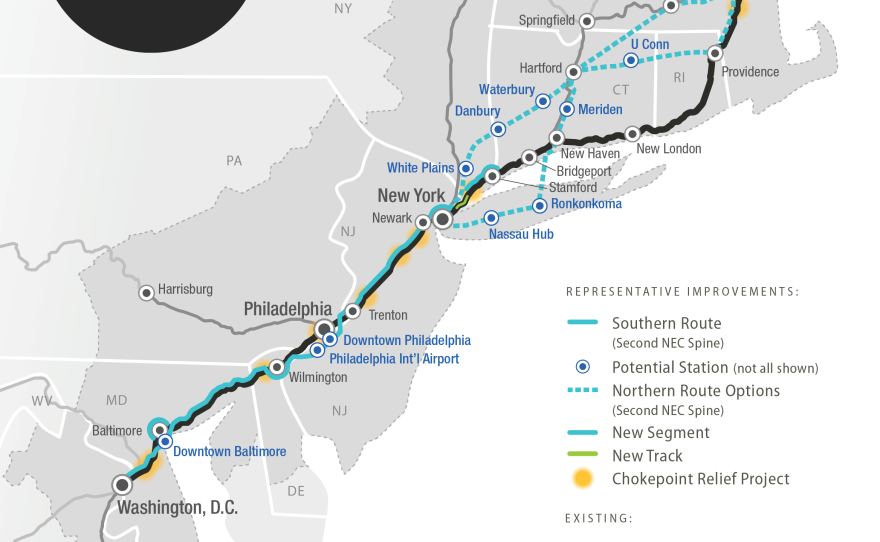One ambitious proposal would connect New York City to Boston by a tunnel under Long Island Sound.
Alternatives for rail lines in the northeast got a public hearing on Monday night in New Haven. The meeting was the second in a series meant to elicit feedback on proposed improvements to the Northeast Corridor.
The Federal Railroad Administration is working to address regular delays for Amtrak and the regional lines along the 457-mile Northeast Corridor. It's the busiest rail line in the U.S., bearing 100-year-old infrastructure along its crowded tracks.
The FRA presented its three alternatives at the meeting, plus a fourth option of "doing nothing."
One option largely aims at maintaining the current state of rail along the corridor, while accommodating some future growth in ridership. The option would include a high-speed rail line from Washington, D.C. to Stamford.
A second option would add a new high-speed rail line from New York to Boston passing through Waterbury, Hartford, and UConn. Trains would travel at 220 miles an hour.
A third and more ambitious proposal would connect New York City to Boston by a tunnel under Long Island Sound -- a plan that could cost nearly $300 billion.

Ginny Kozlowski was at the meeting. She's the executive director of the Economic Development Corporation of New Haven, a non-profit organization promoting economic development in southern Connecticut. She said some of the proposals are just too costly.
"To acquire the land and to do all the environmental work, it's gonna be probably prohibitively expensive," Kozlowski said. "Again, I think it's about dollars and cents, and we already have the infrastructure here that obviously needs to be in a state of good repair."
Kozlowski said she favors a less expensive plan that would add new rail segments and improve existing sections of the corridor.
The FRA acknowledges that the Northeast Corridor, used by more than 2,200 trains, is currently in a state of poor repair. Train operators and passengers experience frequent, sometimes heavy delays on obsolete infrastructure created by several different rail companies between 1830 and 1917.
Monday's meeting was the second in a series of eleven public hearings across the northeast.
The FRA will hold another public hearing in Connecticut on January 13 at the Lyceum in Hartford. A final decision will be announced in the spring.
Diane Orson, Leyda Quast and Ryan Caron King contributed to this report, which includes information from WSHU Public Radio.









